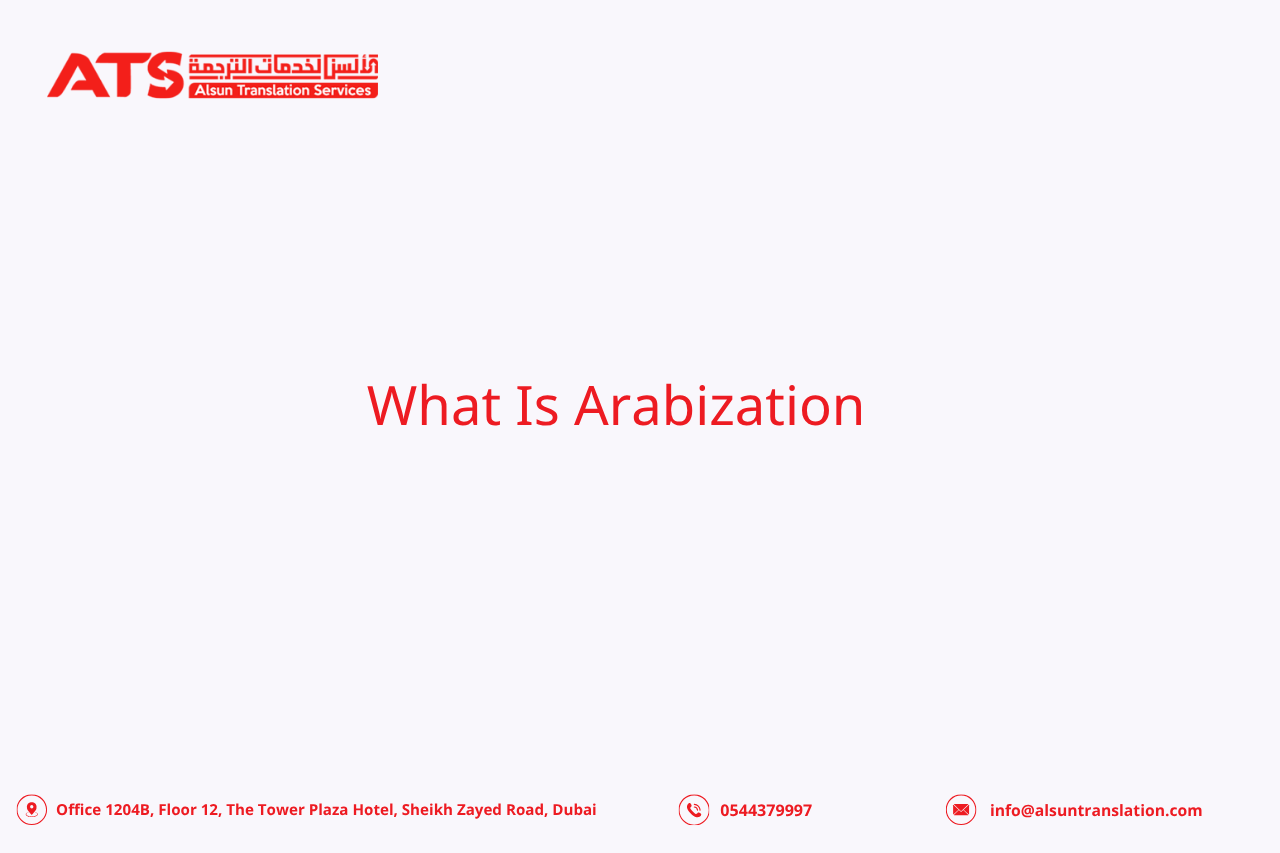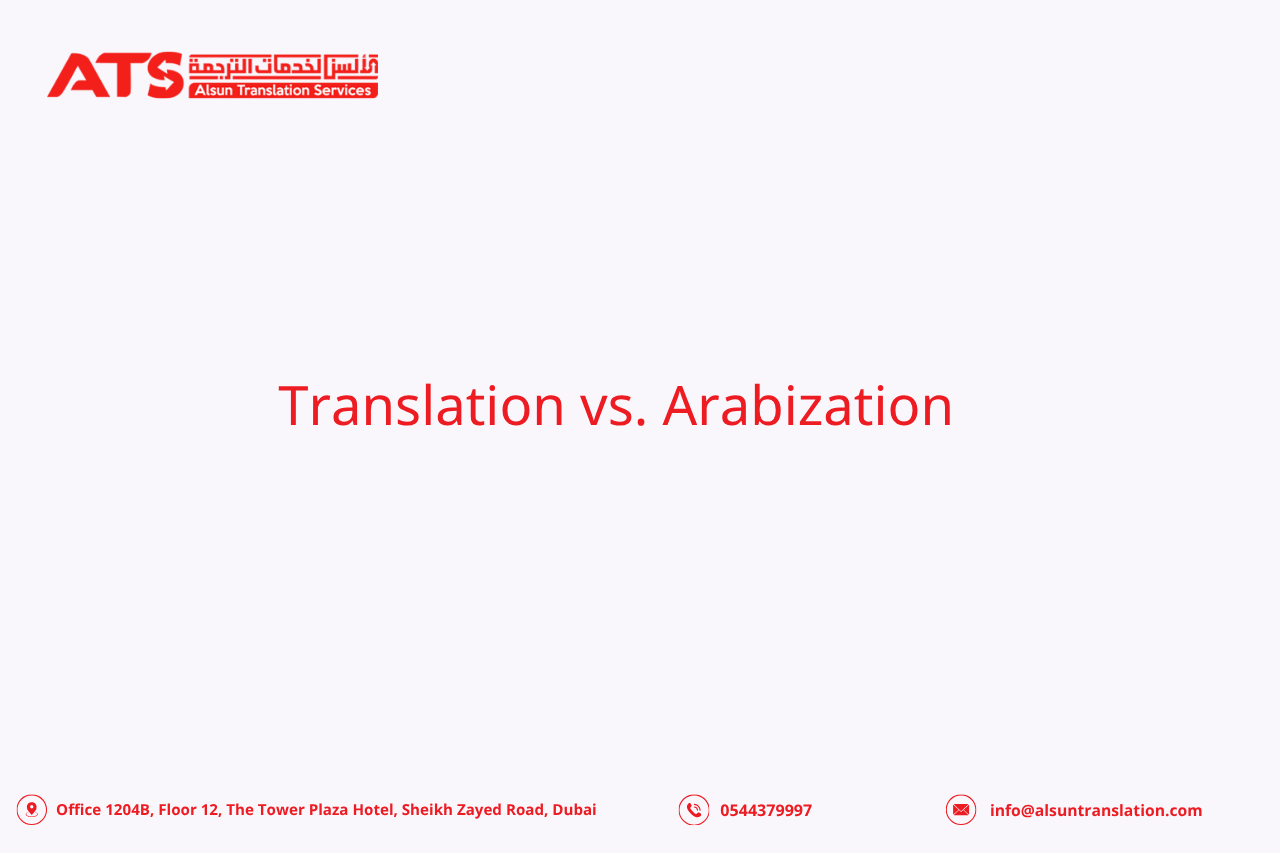The language barrier is a fundamental obstacle in many businesses, as effective communication is crucial for spreading cultures and expanding businesses.
Here comes the role of translation or Arabization. Many people believe they are synonyms for the same word, but there are fundamental differences between them. In this article, we will discuss translation vs. Arabization and the importance of each.
What is Translation?
When comparing translation vs. Arabization, it must be known that translation is the process of converting a written text from one language to another, taking into account the cultural, political, and linguistic differences between the source and target languages.
The original meaning of the text must be preserved during the translation process.
Translation has greatly helped in disseminating many works by translating marketing materials, contracts, and agreements, which has led to the expansion of companies and reaching a larger audience after breaking the language barrier.
What is Arabization?

Arabization is the process of transferring a non-Arabic word and introducing it into the Arabic language, making simple modifications to it to adapt to the culture of the Arab audience, such as changing colors, images, or the tone of the message.
There are many Arabized foreign words that have become as if they are part of the Arabic language, such as “تلفزيون” which means television and “تكنولوجيا” which means technology. The Arab audience has become accustomed to them as if they are of Arabic origin.
Arabization began among Arabs in ancient times. It appeared during the era of Caliph Omar ibn al-Khattab when some Arabic coins were minted, and the terms written on them were Arabized.
After that, the use of Arabization increased, especially in scientific and medical terms.
Importance of Arabization
Arabization is the language that connects ancient scientific heritage with modern sciences. This greatly helps in the advancement of the nation because it aids in understanding some sciences about which much research is conducted in other languages, such as physics, chemistry, or medicine.
Therefore, we must know these terms, whether they are in the industrial, technological, or medical fields, to be part of our intellectual formation.
Arabized terms help make the Arabic language more flexible, which helps in enriching some linguistic studies. It also greatly assists in effective communication between many international companies and organizations that have branches in Arab countries.
Furthermore, fields like programming and websites require adapting written and visual content to suit the Arab culture.
Arabization vs Translation: What’s the Difference?
We will now provide in detail all what you should know about Translation vs. Arabization:
|
Translation |
Arabization |
| The primary goal of the translation process is to transfer the text from one language to another while preserving the meaning. |
Its primary goal is to make the content suitable for the Arab audience. |
|
The meaning is transferred from the source language to the target language. |
Words are transferred as they are, with simple modifications to suit the Arab culture. |
| One of its main challenges is the need to adapt the text to the target audience while maintaining the original style. |
The Arabization process faces challenges such as differences between Arabic dialects and lack of standardized terminology. |
|
It includes various fields of knowledge, including commercial, legal, and others. |
It is used in many specializations, the most clear of which are the scientific and technical fields. |
| One of the most important tools used in translation is CAT tools. |
One of the main tools used in Arabization is a Localization Management System (LMS). |
Fields That Require Arabization
After talking about Translation vs. Arabization, there are some fields where Arabization is highly requested, including:
- Some types of arts.
- Technology field.
- Industrial field.
- Medical field.
- Scientific fields such as chemistry, physics, and mathematics.
- Religious sciences.
- Pharmaceutical field.
Languages and Scripts Involved in Arabization
When trying to answer the question “What is Arabization?”, there are some rules that must be observed when transferring words from a foreign language to Arabic to preserve the authenticity of the language and make foreign terms understandable to Arab readers. Among the most obvious of these rules are:
- Abbreviating or simplifying some foreign words to fit the structure of the Arabic word.
- The word must be subject to Arabic grammar and morphology rules in terms of pluralization, feminization, and vowelization.
- Known Arabic meters are used to facilitate the pronunciation of the word.
- Pronouncing the word in a way that its phonetics fit with Arabic phonetics.
- The definite article “al-” can be added to the word to suit Arabic usage.
Arabization Services in Dubai
Alsun is one of the leading companies that provide translation and Arabization services throughout the United Arab Emirates, especially in the city of Dubai, which has become a distinctive cultural and economic city in the UAE.
Arabization has greatly contributed to spreading some brands and new products into the Arab market, and the need for it has increased after the recent economic openness.
We provide Arabization services in various fields, whether technological or for some products introduced to Arab markets, when promoting new brands, or in the cultural and scientific fields.
Why Choose Alsun?
After comparing Translation vs. Arabization, a company that is distinguished by great accuracy must be chosen to provide translation and Arabization services, such as Alsun, which has many advantages:
Modern Tools
The company uses the best modern tools in the field of translation or Arabization, such as CAT tools or LMS. These tools have greatly helped in the accuracy and speed of translation and Arabization.
Specialized Work Team
The company has a specialized team to perform translation or Arabization services, ensuring that all correct rules are followed and the finest details are attended to, with another team for reviewing all documents before delivery.
Ease of Communication
The company provides excellent customer service to answer all inquiries and questions 24/7. Documents to be translated or Arabized can also be received via the internet to save time and effort.
Prices
We have special offers on prices most days of the year. Although many factors affect the price of translated documents from one document to another, our translation price starts from AED 30 per page.
Fast Delivery
At Alsun, we are keen to deliver all documents in a time ranging from 24 to 48 hours for regular documents. We also have fast translation services where you can receive the document after it has been Arabized or translated on the same day.
Need Urgent Translation Services!
Our translators provide legal and accurate translation for your official documents in a few hours.
Conclusion
Although there is a difference between translation and Arabization, they both help in enhancing cultural communication and expanding knowledge.
When we get to know translation vs. Arabization, we find that both are vital tools that help in breaking the language barrier.
However, distinguished companies must be chosen to perform Arabization or translation, such as Alsun. Therefore, do not waste time and request translation or Arabization services now and get a competitive price quote.
FAQs
What is the process of Arabization?
It is the process of transferring a word or a few words with their foreign pronunciation into the Arabic language, but it must be ensured that it fits with the characteristics of the Arabic language and is compatible with it.
What are the methods of Arabization?
There are two methods of Arabization in the Arabic language: Arabization without change, where the word is transferred as it is from its mother tongue to the Arabic language, or Arabization with change, such as replacing a letter with another, changing the vowelization, or adding or deleting a letter.
